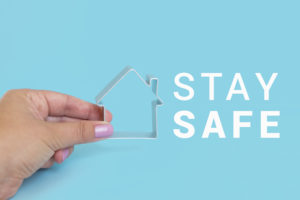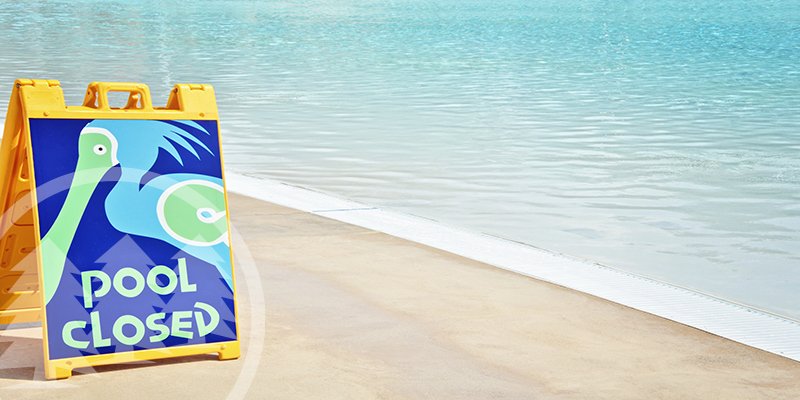By now, virtually everyone across the United States is aware of how contagious COVID-19 can be. Fighting a virus that spreads so easily is an uphill battle. And a common question HOAs face is whether or not closing community pools during coronavirus is the right thing to do.
Shutting Down Community Pools During Coronavirus
The novel coronavirus, otherwise known as COVID-19, has thrown a wrench into the world’s plans. Flight cancellations, country restrictions, and temporary business closures have all taken place as a result. Employees are even getting laid off or forced to go on unpaid leave as businesses struggle to compensate them.
Perhaps one of the most difficult parts of the war against COVID-19, though, is that it is highly infectious. In fact, it is so contagious that the Centers for Disease Control and Prevention is recommending people stay 6 ft apart to mitigate the spread. President Trump has even gone as far as to ask gatherings to be limited to no more than 10 people.
While it is known that the virus spreads easily from person to person, many wonder whether there are other modes of transmission. For instance, is it possible to catch the disease by swimming in public or community pools?
A number of homeowners associations around the country have already made the decision to close community pools. If your HOA is unsure whether to follow suit, let us first break down some important information.
Can Coronavirus Spread Through Pools?
 First of all, it is worth noting that the coronavirus or COVID-19 is a respiratory virus. This means that it is spread through tiny droplets of mucus and spit.
First of all, it is worth noting that the coronavirus or COVID-19 is a respiratory virus. This means that it is spread through tiny droplets of mucus and spit.
For example, if a person with COVID-19 were to sneeze, those immediately within this person’s range are at risk of catching it. The virus infects a person when droplets enter their eyes, nose, or mouth. This is why the CDC recommends refraining from touching your face with unclean hands.
As for whether the coronavirus spreads through pools, according to the CDC, there is no evidence supporting this claim. Since COVID-19 is new, though, not everything is known about the disease yet. However, at this time, experts believe it does not spread through water, be it drinking water or pool water.
Does That Mean It Is Safe to Swim?
Since no evidence currently exists that coronavirus can be transmitted through pools, it is only normal to wonder whether it is okay to swim in them. Technically speaking, the amount of chlorine present in pool water can kill the virus. However, just because it is safe does not mean it is recommended.
Community pools are typically open and public spaces. This means community members are free to use them at any time. When more people are involved, the area becomes less safe.
If just one of them is infected, it is likely you will catch the virus even before you even touch the chlorinated water. After all, it is nearly impossible to enter and leave the pool area without touching surfaces or coming into contact with anyone.
Some research initially suggested that the virus can live on hard surfaces for up to three days. It may also stay in the air in the form of aerosol for up to 30 minutes. With that in mind, though, the CDC states that the virus does not spread easily via hard surfaces or objects. Experts also believe that swimming at the beach or in a pool is generally safe to do.
While there is a low risk of catching the virus through hard surfaces, a risk is still a risk. You can control your own hands and practice proper handwashing techniques. However, you cannot be sure others are doing the same. Furthermore, you cannot always ensure that everyone keeps a safe distance from each other.
Should the HOA Close Community Pools During Coronavirus?
If your HOA board does decide to keep the community pool open, it is important to practice proper and regular maintenance and disinfection. Use chlorine and bromine in pools to kill the coronavirus.
Moreover, you must make sure all surfaces and areas are clean. This may mean ramping up cleaning services to leave no stone unturned.
Install sanitation stations such as alcohol dispensers or sanitary wipes near high-touch areas. Ask residents to wear face masks at all times. You can even move pool furniture around to encourage social distancing or allow limited admittance to the pool area.
Follow the guidelines set forth by the CDC for the proper cleaning and disinfection of community facilities. It is not enough to focus your efforts on disinfecting pool water and neglect other areas.
On the other hand, your HOA may want to follow in the footsteps of other community associations. Closing community pools during COVID-19 is an option many have taken.
After all, pools are non-essential facilities in an HOA community. And with the risk of attracting large gatherings of people, it is a good idea to err on the side of caution when it comes to community pools during coronavirus.
Still, in the end, the decision lies with your HOA board. No two communities are made the same, so it really depends on your situation. But if your state or local authorities and health officials recommend closing down your community pool, it is best to just follow their advice.
Better Safe Than Sorry
 During a health crisis like the COVID-19 outbreak, it is normal to feel confused and lost. For many, this is an entirely new experience and the uncertainty of it all makes it all the more frightening.
During a health crisis like the COVID-19 outbreak, it is normal to feel confused and lost. For many, this is an entirely new experience and the uncertainty of it all makes it all the more frightening.
In the fight against the coronavirus, a critical step is to limit its spread. Everyone must do their part to help flatten the curve, HOAs included.
Not all HOAs are made equal, and some are having more trouble coping with the COVID-19 pandemic than others. If you feel like your HOA needs help, do not hesitate to reach out to us today.
RELATED ARTICLES:
- Coronavirus Activities For Community: Staying Together Despite The Distance
- Homeowners Association Meeting Protocols – Coronavirus Covid-19
- Green HOA Practices To Apply For An Eco-Friendly Community






